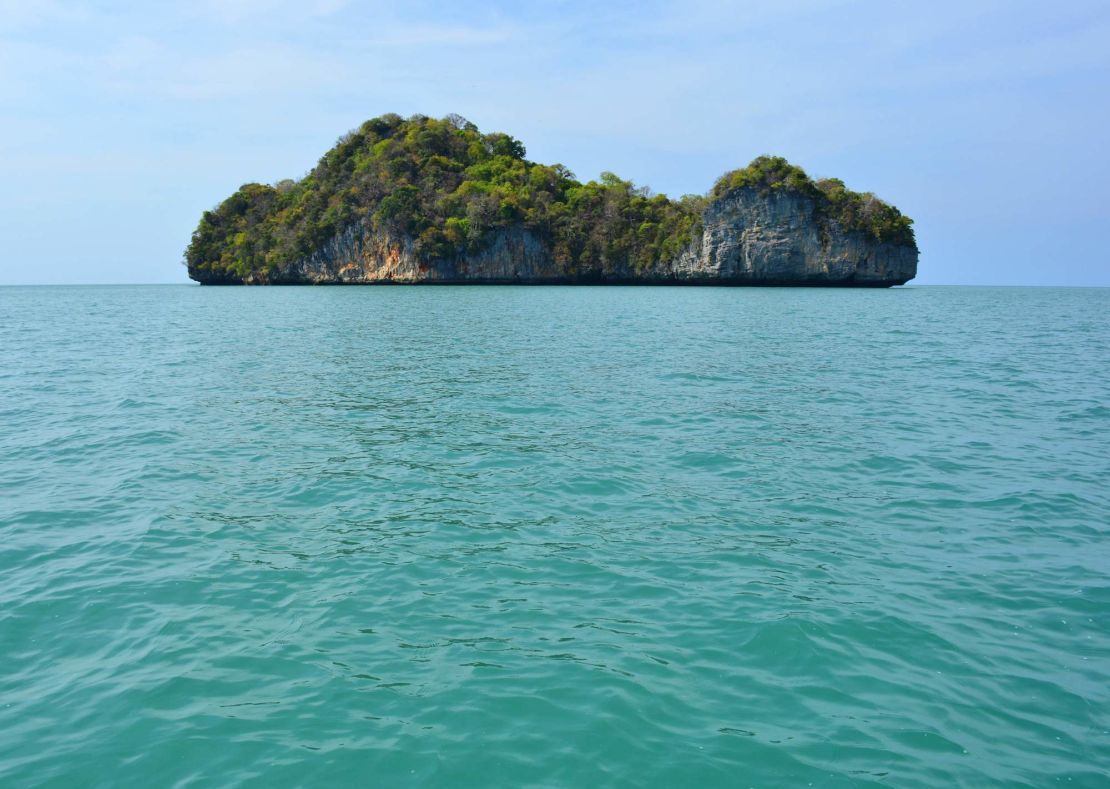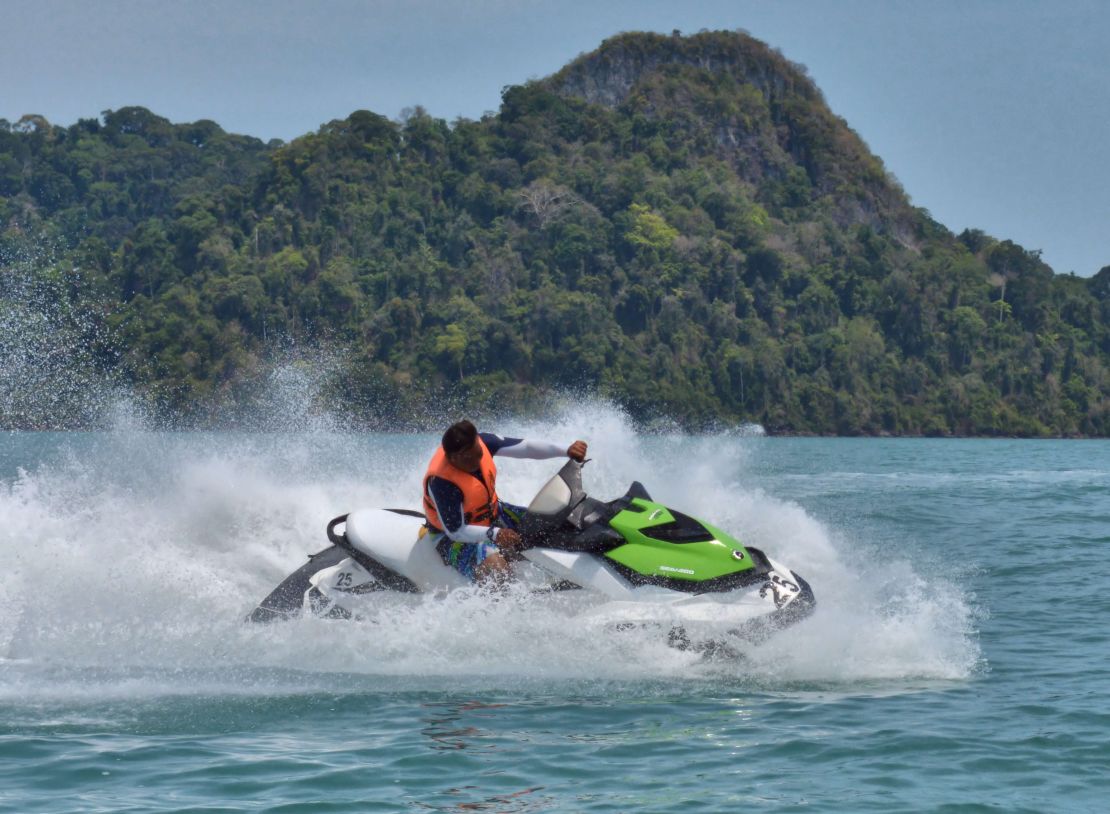Ten minutes ago, I learned how to start a Jet Ski.
Now it’s going 30 miles per hour, skimming across the Andaman Sea in Langkawi, a tropical island off northwest coast of of Malaysia.
Setting off on a four-hour expedition through the stunning Langkawi archipelago – a cluster of more than 100 islands – there’s no one else around, aside from a few fellow riders. The waves rise and fall, forested islands bob above the horizon and tropical birds swoop overhead. It quickly becomes apparent that there are few places on Earth more suited for such an experience.
While the most popular way to see the UNESCO Global Geopark is on a boat tour, it pales in comparison with exploring the islands by personal watercraft.
Our group is made up of four Jet Skis – one occupied by guide Shahrul Rizwan. We leave in an arrowhead formation, with Shahrul leading the charge.
Finding your footing

Operating personal watercraft is a matter of faith. Novices like myself must learn to trust that the machine won’t betray us and that our instructor is leading us into safe water. For the first few minutes, I eyeball each upcoming ocean ripple with mistrust.
It sways left and right, seeming to ignore a forceful grip and obey only the unpredictable rhythms of the sea. Turns out I’m just traveling too slowly, says Shahrul.
Pushing the throttle all the way down, I watch as the speedometer climbs to 43 miles per hour. While my hat threatens to dislodge, the craft handles this more extreme situation with aplomb.
It feels like it’s almost hovering above the water, at times departing the crest of waves to become airborne. Finally, my posture relaxes and my gaze lifts. The scenery is extraordinary.
Get invaluable insider tips on visiting Langkawi in Malaysia
Pedal to the metal
To my left is the pristine coastline of the main island, Pulau Langkawi, with palm trees tilted and golden sand glowing in the morning sunlight. To my right is seemingly endless, deep-blue ocean.
Straight ahead are many small yet lofty islands, their steep limestone cliff faces rising up towards lush jungle, where sea birds nest and monkeys cavort.
I’ve seen such tropical islands up close while on boat tours in Malaysia, Thailand, Indonesia and Vietnam. But inspecting them on a jet ski is a vastly superior experience. On boat tours, travelers have only limited chances to stop and admire the islands. The beauty of Jet Ski tours, aside from the adrenalin surge, is the sense of freedom.
Thanks to the nimbleness of the Jet Skis, travelers can circle each island at their own pace, locating the best angles for photos, drifting through caves and pulling up at tiny beaches.
Passing through a tight group of islands known as “The Fjords,” travelers can stop to inspect ancient rock paintings, and watch local fishermen spear hunting.
The small size and agility of these machines means there is almost nowhere we can’t explore. At one point we duck our heads to pass through a narrow cliff cave, reaching out a hand to feel the jagged surface of its walls.
Throughout these intimate experiences, Shahrul looks as enchanted as his guests. He tells me that, while he loves the adrenalin of hitting top speed, it is the ability to observe nature from up close he most cherishes.
“Most people never in their life can do this – explore the ocean, see the animals, feel so free,” he says. “I’m always smiling, always happy when I’m out in the ocean. I feel like I can do anything I want.”
Mystical lake
One of the chief destinations is the second-largest island in the archipelago, Dayang Bunting, which is almost 12.4 miles (20 kilometers) from Cenang Beach, where the ride began.
It’s home to the famed Pregnant Maiden Lake. The name comes from a local legend that infertile women who trek through the island’s dense forest and bathe in its mystical lake will be able to have children.
Although none of the members of our group are planning a pregnancy, we happily moor our jet skis at the island’s southern pier and take a five-minute walk through its lush forest to this mystical lake. The vegetation on Dayang Bunting is remarkably dense, with trees hanging over the path to the lake.
This seems to suit the dozens of monkeys perched on branches peering down on the steady flow of tourists. Just before we reach the lake I notice another local spying upon us – a monitor lizard, at least 60 centimeters long, is watching on from the shade of a bush by the lake.
Ringed by soaring, jungle-draped hills, the lake owns a spectacular location. Its warm, green waters are inviting and dozens of tourists are leaping in to swim or go kayaking. Our group chooses merely to lie floating on the surface, chatting and admiring this tropical haven.
Free as a bird

After 40 minutes, we return to our Jet Skis and leave the island.
By this point, each of us is operating our crafts like an old pro. Safe in this knowledge, Shahrul pauses on an area of particularly flat water and offers us 10 minutes to freestyle before we make a final stop on our route back to Cenang Beach.
In a small cove of Singa Besar Island, a flock of birds flies overhead. It isn’t until they descend that we realize just how huge these animals are – some have wingspans of up to one meter.
These white-bellied sea eagles and Brahminy kite eagles have identified the arrival of a tourist boat as a sign of feeding time. At first they are circling slowly, surveying the scene. Then suddenly they begin swooping at startling speed to snatch snacks thrown in by a nearby boat operator from the ocean’s surface.
Found in abundance in the archipelago, the Brahminys are an icon of Langkawi. With their white heads and contrasting brown wings, they cut spectacular figures as they effortlessly maneuver through the air. While tearing around on my jet ski, I felt like I was experiencing Langkawi in a manner which could not be topped.
Turns out these powerful birds have an even grander view of this gorgeous archipelago.
Mega Water Sports offers three different Jet Ski tours. Prices start from $135 per person for a four-hour experience.
Ronan O’Connell is a freelance photojournalist. He’s contributed to numerous media outlets including CNN, BBC, The Guardian, Travel Talk magazine and The Australian Financial Review.
















